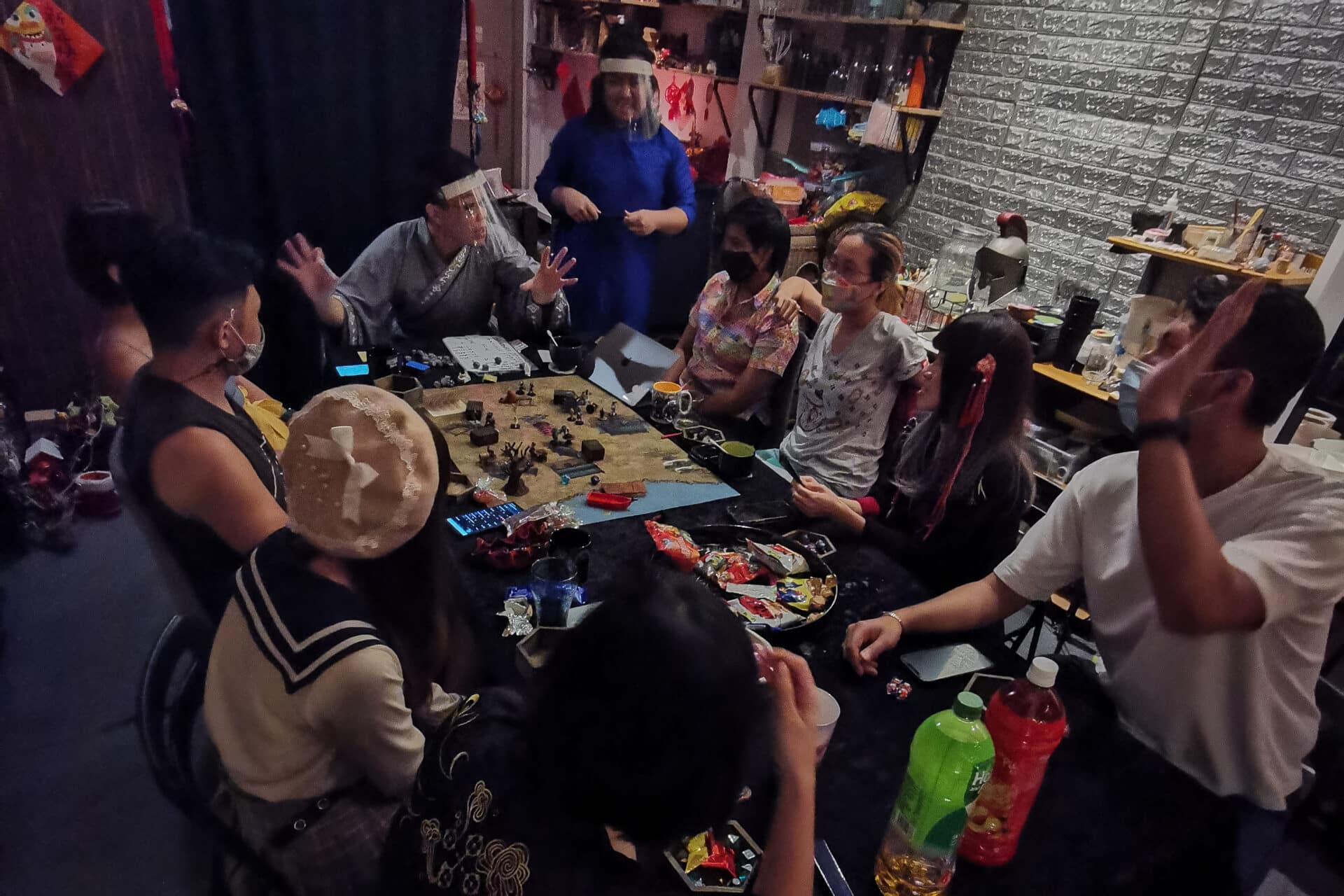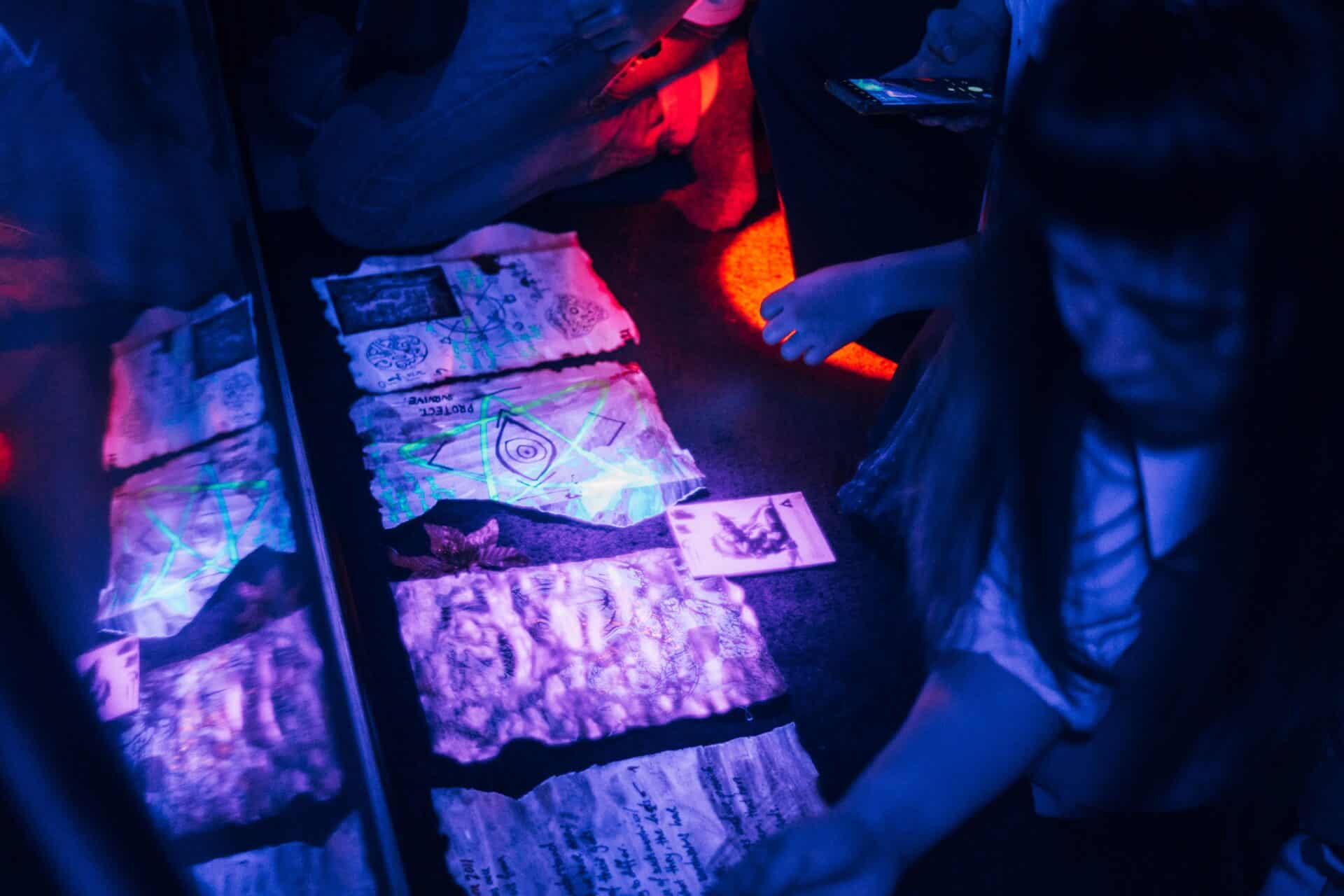We Live As We Dream — Playing Dungeons & Dragons
Photo: Mello
Tinker Tales Studios | 2,967 words
We live as we dream — alone. Donne was wrong: language, social bonds, these flimsy constructs only appear to bind us each to each. Just think of how communication is always painfully fraught. You say one thing, I hear another. I always imagined individuals as neurons — designed to work together, yet divided from their counterparts by that frustratingly infinitesimal gap, ultimately dependent on the sheer goodwill of the universe for fragile molecules of messages to get across.
For a long time, this was what I thought.
I don’t know if I still think so now.
*
The taxi uncle peers dubiously at the building which rises before us, weirdly colorless in the evening dark. It is an industrial building, that much is stolidly clear. I’ve never seen this particular building before, but I’ve seen its kind. It has duplicates all over Singapore: stocky and solid, all long horizontal lines, bands of cockroach-brown windows, a workaday matter-of-factness and no-frills-ness. What’s the architectural term for this style? Get-on-with-it Brutalism, perhaps.
The place seems empty. It’s 7.10 pm, well past the typical work day. The taxi uncle looks round at me. “Miss ah, you sure this is the right place?”
I too am staring out the window. Now I check the address once more. 1001 Jalan Bukit Merah. Which, delightfully but also ominously, translates to Red Hill Road. And which begs the question, why is the hill red, well there are stories about that…
I cut off the anxious babbling in my brain. I cannot loiter on the outside forever. “Yes, uncle, this is the right place. Thank you.”
I slam the door. Because I want to project a sense of confidence that I am in the right place, I blunder at random up the nearest ramp I see. I stop. There is a rat sitting in the middle of the blank grey cement floor. We regard one another with something like mild surprise.
It is, as beginnings go, not an auspicious one.
*
What is it about beginnings which make them so daunting? The mind recoils from the usual clichés: that saying attributed to Yoda (you know, “Do or do not…”), or that quote which adorns a million institutional walls (you know, the one about journeys of a thousand miles) — but the truth behind those statements continues to reanimate their very dead carcasses because, well, it is truth.
I stand outside the door to unit 02-13. There is a whiteboard affixed to the door, which reassures me in a friendly scrawl that I am really in the right place. Nonetheless, I hesitate. My problems are twofold. First, despite it being 7.10 pm, I am actually early — the place may be correct but the time, not so much. Second — I have no idea what will happen when I cross that threshold.
I am hesitating in the corridor, in the middle of an apparently deserted industrial building, because I’ve signed up to play Dungeons and Dragons. What sits beyond the door is Tinker Tales Studios, a space for people to experience table-top role-playing games (TTRPGs for short), and generally have a convivial time.
For years, watching people play TTRPGS was my hobby. This habit started, as so many things seem to have done, during the lockdown period imposed by Covid-19. With commuting a thing of the past, and the work day reorganized, I suddenly had time to kill. Through sheer friendly fate, I bumbled into that corner of YouTube which consists of people playing TTRPGs and streaming their games to viewers.
And what a welcoming corner it is. Of course many of these videos are money-making products, the glossy end result of whole teams’ creative and organizational and logistical efforts — but for an hour, or two, or four (yes, these game sessions run long), I could imagine that I was really there. I could imagine that I was sitting, a happy ghost, at a table with a group of friends, roleplaying in a fantasy (the genre, but also the adjective) world. I laughed along at the jokes. I wept with my “friends” when one of their characters died. I was there with them in spirit — though in cold jagged reality, of course I was not.
But perhaps I have it the wrong way round. Perhaps they were the ghosts, these people who existed, for me, only on a screen. Clichés about outsiders and looking in now spring to mind. Nonetheless, TTRPGs were a lifeline in an unsettling time. I grew to need the mental and emotional ballast these episodes provided. Without that weekly dose of dice rolling and storytelling and camaraderie, my mood plummeted.
It’s difficult. We live as we dream — alone. And yet we are undeniably social animals.
Somehow, it never crossed my mind that I too could do these things. I too could create a character, and bring that character to a table of friends, in the real world, and together, we could move beyond this physical world, revealing ourselves through our words to be elves and orcs and halflings. Whatever happened in sharp, lonely reality, in our imaginations at least we would fight evil foes and find clever solutions, and somehow, slowly, end up saving the world — together.
*
I look at the time on my phone yet again. I cannot stay outside forever. I push the door open.
A confusion of impressions. A narrow room which immediately makes me think of a study. One shared among friends, and lived in, and therefore in a constant state of excited mess. An oddly comforting dimness. An overwhelming sense of purposeful clutter, of many, many things collected by many, many minds over many, many months, which have found their place and settled where they are in familiar tableaus. There are cubbies for shoes to the left of the entrance, like they have in kindergartens; maroon curtains in the back; a cat dish tucked under a shelf; a bench heaped with a confusion of books and boxes and huge maps delineating landmasses which have never existed in reality; and most excitingly, rank upon rank upon rank of tiny figurines, immortalized for eternity in heroic poses, all organized neatly in glass cases, with enticingly exotic labels affixed to each case.
I hear voices, but I see no one. Then a figure appears from somewhere in the back. This is Mello, who among other things takes care of bookings and therefore is the person everyone who comes here encounters first. She says hello. She is clearly so, so at home in this place. She says that since this is the first time I will be playing with Tinker Tales, I get a free dice set and a bag to store them in — I get to pick! I follow her gesture, and see that a selection of dice in their clear plastic baggies have been piled neatly in a fish tank.
Such pleasing incongruity.
The wealthy and well-educated Renaissance gentleman would gather oddities, rarities, interesting specimens, and organize them into little private museums called Cabinets of Curiosities. I look around me — at the books, the shelves overflowing with material markers of peoples’ fantasies, the already narrow space further subdivided like a conjurer’s trunk by curtains and racks and who knows what else — and think to myself, with a little thrill, I am in a Cabinet of Curiosities right now.
*
Just as Covid-19 really started to reshape life in Singapore, the Sunday Times published a poll wherein 71% of the thousand or so respondents deemed “artist” to be the most non-essential job on its provided list.
Obviously, the results ignited discussion, as the paper had clearly intended. I on the other hand was surprised that anyone found it surprising. This is a country where a previous Prime Minister famously called poetry “a luxury we cannot afford.” This hits home — hard. I have personally had to field questions along the lines of, “But what can my son do in future if he takes Literature/Philosophy/Art in school?” Of course Singapore, too, has its version of a Dream. But the term coined for it is “The Five C’s”: cash, car, credit card, condominium, country club.
What strangely material form our Dream takes.

Surely, surely, anyone who prizes the imagination, who values the role of the inner voice, who finds beauty and pathos in the half-hidden thoughts which spring to life in those strange secret places of the mind — anyone like this would know, if they’ve been in Singapore long enough, that these urges and desires and happinesses are seen by the majority as odd, perplexing, impractical? One gets on with it, in this place. One focuses on putting a roof over one’s head, and (preferably good) food in one’s mouth, and with inflation soaring, and real estate prices what they are — well, best be practical first, and if you have any time and energy left over from the labors of the day, only then might you indulge in some dreaming.
This is why the TTRPG studio I’d found by chance is truly an oddity in this hardworking, hard-nosed, hard-headed country. Tinker Tales Studios is a hybrid creature: part money-making enterprise (cold hard cash is always pragmatic), but also part hobbyist community (imagine, making up stories together for three whole hours). The whole enterprise is a weird chimera — but perhaps all the more powerful and valuable because of how it draws together so many odd strands in so many unusual ways.
The sum is greater than its parts. Such a clichéd thing to say.
Then again — don’t clichés, because they act as a common language, and bear a community’s shared wisdom and experience, ultimately serve as further reminders of the connections between us?
*
It turns out that it’s a good thing I’ve arrived early. Because Dungeons and Dragons is a storytelling game where players might encounter discomforting themes, before anyone can play there is a massive trigger warning and safety questionnaire to fill out.
I am completing mine very, very slowly. I’m so slow because I’m savoring the care and thought which went into the questionnaire. Tinker Tales Studios does not assume that a player is able or willing to voice these difficult ideas themselves. So, the form lists in exhaustive detail, over two pages, various topics which might make someone uncomfortable; it even offers different “gradations” of the extent to which a player might be comfortable dealing with particular topics in a game. For instance, one might be fine with romance appearing in the game as a general theme, but be unwilling to engage in fantasy romance with another player. Or one might mark a topic as absolutely, completely verboten — no mentions to be made about it at all. And of course, since snacks and drinks are provided gratis, the shop very, very carefully asks for food allergies.
I finally come to the bottom of the second page, read the last question, and burst out laughing. One of the things which the shop checks on is our willingness to encounter — puns. Nick, who’s running tonight’s game, explains that this questionnaire takes the shape it does because of the players. One player had expressed frustration with the sheer quantity of puns in his game — and the shop respects that.
This makes me so happy.
Scholars have debunked that clichéd — clichés yet again! — feel-good anecdote about Margaret Mead calling a healed femur “the first sign of civilization”, because a healed femur supposedly meant that someone received help from others. Yet clearly there is truth, too, in this cliché. I want this story to be true — and in a million different ways, all across the globe, this story is happening, over and over again, right now. People are caring for one another, healing one another, being careful about causing one another pain, being cognizant of their words and actions, being protective of someone else’s mind and heart and being.
Hadn’t the taxi uncle checked to make sure I wouldn’t be going into an apparently deserted industrial building at night?
Sometimes, care takes the form of a healed bone, a healed wound, a healed heart. Sometimes, care takes the form of a story which holds comfort, even if it’s untrue by the harsh light of “reality.” Sometimes, care takes the form of a simple question. Sometimes, care takes the form of a very, very detailed questionnaire.
I look at the sheet, densely printed on both sides. The ghosts of so many players and their experiences and their hurts haunts this manifestation of care, animates it over and over, keeps it alive and well and growing.
Despite the forbidding exterior of the building, despite that odd beginning, I am in the right place after all, in more ways than one.
*
I am eleven. I am sitting across from my best friend Sanni. We’ve a project to complete, and she’s hard at work, but I am sitting in silence, staring at my lap, because I’ve just experienced a revelation.
I’d always found group work, projects, team sports excruciating. And for whatever reason, at that moment, I’d realized why.
I look up. I tell Sanni, loudly and abruptly, “It’s dangerous to be dependent on others.”
My friend is used to my odd ways. “Explain.”
I explain my (childish) realization, that our need for others is a form of vulnerability. That one would be infinitely more powerful, safer, more secure, if one could shed this weakness.
Sanni says nothing for a while. Now, with time overlaid on experience, I can see how much wiser she was compared to me. Finally she says, “You can try and see how that goes.”
*
I am laughing. We all are. We cluster round a table, in the dim, warm light of the shop. We’ve met for the first time tonight. None of us know if we will ever play at the same table again, given that this is a One Shot, i.e. a standalone adventure, as opposed to a Campaign, where players return each week for a next instalment of fantasy shenanigans. All we know of one another, at this point, are names: Alice, Sam, Matthew, Nick. But somehow, as Nick, who is the Game Master, describes the dock on which we/our characters find our/themselves, and Alice/Alice’s character immediately provokes a fight with the most dangerous-looking figure in the vicinity — we’re laughing, we’re frowning in concentration, we’re arguing amicably over our next move. Somehow, through the conceit of the game, and the urgent force of the story which Nick has set up, we’ve become a team, and we’re on an adventure together, and that feels good.
No one who hasn’t played a TTRPG can imagine, I think, the sheer wonder of that moment when the game begins, where with the thrilling abruptness of a plane lifting off the ground, reality begins to mist into fantasy and the prosaic is suddenly overlaid with the haunting delineations of the imagination.
We are there, in that industrial estate, in that room, that crowded labyrinth of miniatures and beautiful madness — but we are also not. Our characters are there with us at the table — but at the same time also not.
This is a space of ghosts, spectres, spirits. Of the spirit.
We are in high spirits, even if, as adventures go, it is a sobering one. As the story unfolds, we discover that we have condemned a child to a slow and painful death, when through sheer belligerence (and, truth be told, without provocation), we fought that child’s mother, pushed her into the sea, and thereby destroyed the dozens of medicines which the woman had been painstakingly gathering for two whole years.

This is how our adventure begins: we/our characters must make right what we had, through our humanness, destroyed. A single thread, unrolled with tempting skill by the Game Master that night. But by the end of three hours, other, different stories have been folded, delicately and with great artistry, onto and into and through that original weave.
Fear and hope and that sheer refusal of the human animal to give up. We lived it all — even if, in cold hard reality, we technically didn’t do any of these things.
One action created the next. One moral dilemma led to another. At each storytelling crossroads, Nick asked each player what we thought should be done, and why. What do you say to this person? What do you do in this moment? Do you want to speak the truth, or no? And so, through this game, through made-up characters in a fantasy world, four strangers end up revealing their thoughts and inner compasses to one another in ways which, I suspect, we may not readily do “in real life,” in other places and times.
This is the beauty of TTRPGs. It is so reductive to call them games. Like the studio, they are weird chimeras: part improv, part game of chance, part exercise in human relations and language. Above all, they are opportunities to tell stories together.
I sit comfortably in a once-unfamiliar space. I look at these people whom I don’t know, and yet in some ways do. I am glad, so glad, that I am no longer just experiencing this magic through a screen. I am proud of myself for taking that first step into this Cabinet of Curiosities. I am thankful that there is still room for places like this in Singapore — perhaps we are not such a pragmatic nation after all.
And as Nick opens tonight’s session the way he always does, “Welcome to Sin-galore,” and I feel that now familiar thrill of an adventure unfolding, of fantasy softly drifting and settling onto reality, I have to admit to myself that that long-held belief of mine might not entirely be true — that perhaps we don’t really live, or dream, alone.
© Josephine Phay






